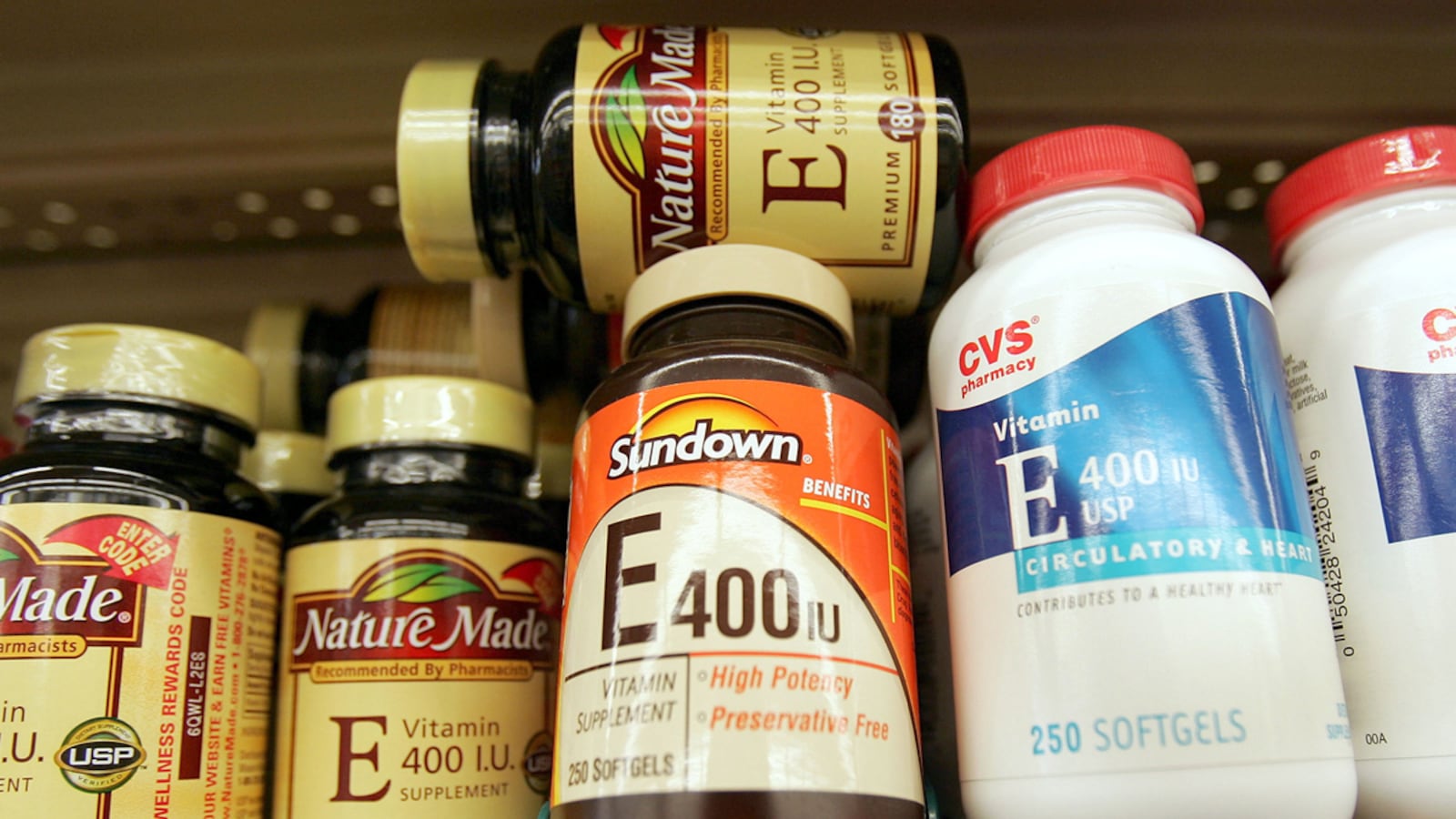Should vitamins and supplements carry warning labels like cigarettes do?
If so, then vitamin E should be the first to get slapped with a surgeon general’s warning.
When a huge study examining whether vitamin E supplements can reduce the risk of prostate cancer had to be halted prematurely in 2008, it was because the men taking vitamin E seemed to be getting no benefit from it. In fact, not only did they not benefit, they exhibited a higher risk of prostate cancer than the men taking a placebo. At the time, the 13 percent increased risk was deemed “statistically non-significant,” meaning the extra cancers might have occurred by chance. Now, further analysis of that study, called the Selenium and Vitamin E Cancer Prevention Trial (SELECT), dashes that hope: The risk is all too real, and not a statistical artifact, the SELECT team reports today in the Journal of the American Medical Association.
Specifically, men who took 400 international units (I.U.) of vitamin E daily—the dosage you can find in bottles sold in every health store and online—were 17 percent more likely to develop prostate cancer over the seven years they were followed. “People think of vitamins and other supplements as innocuous, even beneficial,” says urologist Eric Klein of the Cleveland Clinic, who co-chaired SELECT. “But they’re not; they can cause harm. There is no reason for men in the general population to take vitamin E supplements.”

While no one should change their behavior based a single study, in this case SELECT is only one of many studies showing that vitamin E has no benefit when it comes to preventing or slowing prostate cancer. This one, published earlier this year in the Journal of Clinical Oncology, failed to show that a combination of vitamin E, selenium, and soy prevents progression from precancerous lesions in the prostate to invasive prostate cancer, as tests on lab animals had suggested. And in 2010, scientists at the Fred Hutchinson Cancer Center in Seattle found that a whole menu of dietary supplements “often suggested for prostate cancer prevention,” including vitamins E and D as well as lycopene (the compound in tomatoes) did no such thing.
Even more studies have shown that common doses of vitamin supplements can be harmful. They range from this 2005 study, which found higher levels of mortality among people who take dietary supplements, to the Alpha-Tocophenol, Beta-Carotene Cancer Prevention Trial (ATBC), which in 1998 reported that male smokers who took beta-carotene had an 18 percent increased incidence of lung cancers and an 8 percent increased overall mortality. A 2005 analysis of 19 separate clinical trials concluded that daily intake of vitamin E supplements of 400 units (the standard dose in pills) or more may increase mortality “and should be avoided.” And in just the last three years, large studies have found that “vitamin C may do more harm than good as it may protect cancer cells,” and “intake of vitamins E and C by 15,000 male physicians for 10 years had no health benefits,” as a 2010 paper summarized.
It wasn’t supposed to be this way. SELECT was launched in 2001 because earlier research had suggested that selenium or vitamin E might reduce the risk of prostate cancer. In particular, ATBC found that men taking 50 I.U. of vitamin E daily had 32 percent fewer cases of prostate cancer than men in the placebo group. By 2008, however, the SELECT scientists could see that the trial would never find the 25 percent reduction in prostate cancer they hoped for; that, plus the suspicion of an increased risk of prostate cancer among men taking vitamin E, is what brought SELECT to a screeching halt three years ago.
The scientists kept track of most of the 35,533 men in the study, however, and have now seen that the increased risk of prostate cancer is no statistical quirk. Of 8,737 men taking 400 units of vitamin E daily, 620 have now developed prostate cancer—that’s 10.9 prostate cancers per 1,000 person-years. Of 8,696 men taking a placebo (the comparison group), 529 (9.3 cancers per 1,000 person-years) developed the disease. Taking vitamin E supplements increased the risk of prostate cancer 17 percent. The increased risk was first apparent during the third year of taking vitamin E, rose every subsequent year—and continued even after the men stopped taking vitamin E, says Klein: “The risk is still there.” Overall, American men have a 16 percent lifetime risk of prostate cancer; a projected 240,890 new cases will be diagnosed this year, and the disease will kill 33,720.
There were two glimmers of good news. One was that among men taking both selenium and vitamin E, there was no increased risk of prostate cancer (though no reduced risk, either.) The other was that the prostate cancers in men taking vitamin E were not especially aggressive, says Klein. And why might earlier studies, especially ATBC, have found a decrease in the risk of prostate cancer in men taking 50 I.U. of vitamin E? For one thing, says Klein, those men took 50 I.U. doses, not 400—adding to the evidence that the more of a vitamin you ingest, the more harmful it may be. In addition, the men in that earlier study were all longtime smokers. “That creates a large oxidative stress,” he says, “so we would expect an antioxidant [like vitamin E] to be helpful.”
How many men are putting themselves at risk? More than 50 percent of Americans 60 or older are taking supplements containing vitamin E, the scientists report. And even though the recommended daily dietary allowance is only 22.4 I.U. for adult men, 23 percent are taking at least 400 I.U. per day—the dose that increases the risk of prostate cancer by 17 percent.
But might the other benefits of vitamin E cancel out its prostate cancer risk? Unfortunately, here, the science provides only more bad news: following these thousands of men for more than seven years “did not demonstrate a benefit for selenium or vitamin E supplementation on risk of colorectal or lung cancer or cardiovascular events,” as many supplement makers claim.
The vitamin E and prostate cancer study isn’t the only alarm to sound this week about dietary supplements. Research published yesterday in the Archives of Internal Medicine found that dietary supplements—including multivitamins, folic acid, iron, and copper—seem to be associated with an increased risk of death in older women. The study is part of the Archives’ “less is more” series, which has shown that many diagnostic tests and medical treatments either offer no benefit or pose a risk of harm, as Newsweek recently described. That supplements might harm the elderly is particularly worrisome, given that many older people—because of appetite loss or difficulty shopping or cooking—derive a significant fraction of their total intake of several nutrients from pills, not food. Of the 38,772 older women in the Iowa Women’s Health Study, for instance, 63 percent reported using at least one supplement daily in 1986, as did 85 percent in 2004. Unfortunately, scientists led by Jaakko Mursu of the University of Eastern Finland and the University of Minnesota, found that multivitamins, vitamin B6, folic acid, magnesium, zinc, copper, and especially iron are all associated with increased risk of death. That is particularly striking because the women who took supplements, who have now been followed for 19 years, tended to be healthier than those who did not. “We see little justification for the general and widespread use of dietary supplements,” the authors conclude.
The supplement-industry trade group, the Council for Responsible Nutrition, railed against the Archives study, suggesting it was part of “a recent drive to combine political agendas with what should be pure science.” And the supplements company Nature Made, in a statement to The Daily Beast, insisted that “it is important to remember that vitamin and mineral supplements are not intended for prevention of disease, they are to support adequate nutrition.”
But many other researchers have reached similar conclusions. In particular, they find that supplements do not reduce mortality or cancer risk or provide any other benefits, including this, this, and many others.
Likewise, the entire antioxidant premise now seems to be built on sand. In part, that is because the compounds do not act in your body the way they do in a test tube (which is where the analysis is done to calculate a compound’s antioxidant potential, or ORAC score.) “Cancer cells in a flask behave very differently from cancer cells in your body, where the levels of interaction are orders of magnitude greater,” says Dr. Richard Lee, medical director of the Integrative Medicine Center at MD Anderson Cancer Center in Houston.
In addition, some of the free radicals that antioxidants neutralize turn out to be powerful anticancer fighters in their own right. Neutralizing them is like wiping out your country’s armed forces just as the enemy masses on the border. “One way our immune system works is by generating free radicals that neutralize infections and possibly cancer cells,” says Lee. “You have to be careful about interfering with that.”
According to the Council for Responsible Nutrition, 150 million Americans currently take dietary supplements. In a gift to the industry, Sen. Orrin Hatch of Utah pushed through legislation 17 years ago that allows supplement manufacturers to make health claims for their products, with no need for federal regulators to OK them. That’s why manufacturers typically say things like “These statements have not been evaluated by the Food and Drug Administration,” as Nature Made’s website puts it. In other words, don’t go looking for warning labels on bottles of vitamins any time soon.





